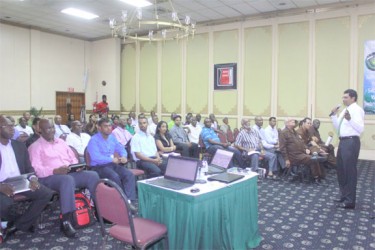Private security firms believe businesspersons are partly to blame for the robberies and related crime perpetrated against them by being careless and taking unnecessary risks.
This view, though not a new one, was reiterated yesterday by professionals in the private security sector during a security seminar at the Pegasus Hotel organised by the Georgetown Chamber of Commerce and Industry (GCCI), which also heard that there has been a monumental rise in “inside jobs.”
Randy Storm, President of the Guyana Association of Private Security Organisations (GAPSO), suggested that business owners are the ones who must take the necessary measures to ensure their protection. Although the Guyana Police Force (GPF) is responsible for providing security, Storm said the force’s focus is dispersed across the length of the country. “But what about our specific business interests,” he questioned.
According to Storm, there are three main aspects of security that must be taken into consideration to curb the epidemic of crimes committed on businesses and business owners: prevention, protection and detection.


Protection, according to Storm, entails employing any and all measures that can be afforded to stop crime before it has a chance to manifest itself.
He offered that one of the most effective ways to prevent such occurrences is to prioritise the well-being of one’s employees, especially since there are increasing cases of employees either being responsible for setting up their employer to be robbed, or carrying out the robbery themselves. GEB Security Services CEO Maurice Amres agreed, saying his firm has been in operation for over five decades and during this time has seen a monumental increase in the amount of “inside jobs.”
Storm therefore urged business owners to ensure that their employees are satisfactorily compensated for their services and are comfortable with the environment in which they work.
He argued that doing these things creates a loyal employee who feels a sense of belonging to, and responsibility for the well-being of the company. In such an atmosphere, Storm said, the employee is less likely to contribute to crime and more likely to take measures to protect the company against it.
Addressing protection, Storm said that too many business operators are being careless and taking unnecessary risks, such as choosing to transport substantial amounts of money on their own. Moreover, he revealed, these businessmen and women are often unarmed and vulnerable to attack.
Amres made reference to an armed robbery that occurred last month, in which East Coast Demerara businessman Cecil Albert Gajadhar and his employee Victor Da Silva were ambushed while transferring several million dollars to Republic Bank. Da Silva died in the attack while Gajadhar was shot to his head. Amres lamented the practice by businesspersons of transferring large amounts of cash on their own, while noting that it is common. He further expressed bewilderment as to why, after suffering such an attack, Gajadhar went to the lengths he did to toss his remaining bag of money over the fence at the bank.
Storm said that it is much more practical for such services, which cost less than $10,000 per trip, to be contracted out to security firms. Aside from the low cost, Storm said, once a customer’s money enters the vehicle of a security firm, the firm assumes responsibility and will be responsible for reimbursing the amounts if anything were to happen. He added that it is less likely for a security vehicle, which transports money, to be attacked, since they are usually armoured and their personnel armed.
Having such protection, he said, is especially important since many of the persons who carry out robberies today are organised to the extent that they stake out the places they intend to “hit” days or weeks in advance.
In relation to personal protection, Amres said that many persons are too lax in this regard. He shared instances where persons had installed security systems but were still robbed because they neglected to arm the system before they left home, or before they went to bed.
Amres said that a security firm will not take responsibility for a robbery which occurred as a result of a customer’s negligence and urged people to “start taking more responsibility for themselves.”
Speaking on detection, Storm shared that in many cases business owners never become aware of the fact that they have been robbed until long after the deed is done. He said that the length of time taken to discover a crime can significantly impact the chances of successfully resolving the matter. As a result, he encouraged business owners to put measures in place to speed up their ability to detect instances of crime perpetrated against them.
For those who seem convinced that taking such measures would be too much of a burden on their pockets, Storm said, “Security is not measured by what it costs but what it is likely to cost you were it not to be in place.”
Meanwhile, Michael Ram, Head of Republic Bank’s Operational Risk Department, said banks have also been making strides in improving security. Ram said that Guyana is a cash society where may persons choose to lug bags and backpacks of money around to carry out their transactions, thereby attracting a lot of risks. Against this background, he said, the bank has been trying to make Guyana less of a cash society, primarily by introducing electronic and plastic services. Persons are not able to carry out the transactions via point of sale machines, which eliminates the need for the use of cash. He said though, that the risk can never be totally extinguished, since having cash sitting in the bank vault is, in itself, a risk.





